
Life Below Water
Water is the essence of life, and the oceans, covering over 70% of our planet, play a vital role in sustaining ecosystems, regulating the climate, and supporting livelihoods. Life below water, encompassing a vast array of marine biodiversity, is crucial for food security, climate regulation, biodiversity and coastal protection. The health of our oceans is intricately linked to human well-being, economic stability, and environmental sustainability. Protecting life below water is essential for ensuring a resilient future. SDG 14: Life Below Water focuses on conserving and sustainably using the world's oceans, seas, and marine resources. The goal recognizes the critical role oceans play in supporting life on Earth, regulating the climate, and providing millions of people a source of income and food. However, human activities such as overfishing, pollution, habitat destruction, and climate change threaten marine ecosystems' health and productivity. Hence, it is crucial for ensuring the sustainability of marine ecosystems and the many benefits they provide to humanity
Nitte (Deemed to be University) (NitteDU)is commuted to be the part of awareness programs to minimize the severity of the problem. NitteDU is actively involved in academic activities, research and development, innovation, international, national, regional and local collaborations, outreach programs, and awareness programs. At the same time NitteDU is also commuted to practices and implementing the best practices to promote Use, Reuse, and Recycle in and off-campus. Water retaining material like cloth/gunny bags etc, during curing, ponding for retaining water on flat concrete structures for curing, curing chemicals / techniques to minimize water requirements, non-potable water (STP) for construction activities, water-efficient plumbing fixtures like push-cock taps, sensor-based taps, aerators, pressure inhibitors, and flow regulators for ensuring constant flow, Separate pipelines for potable water, water for recycling and treated water are provisioned for during construction, provision for rainwater harvesting, provision for management of stormwater, rainwater storage ponds have been created in the campus for storage of storm water, rainwater from an artificially created storage pond from an external location near the campus is used. Multiple MoU has been signed with the academic institute and industry to strengthen our commitments.
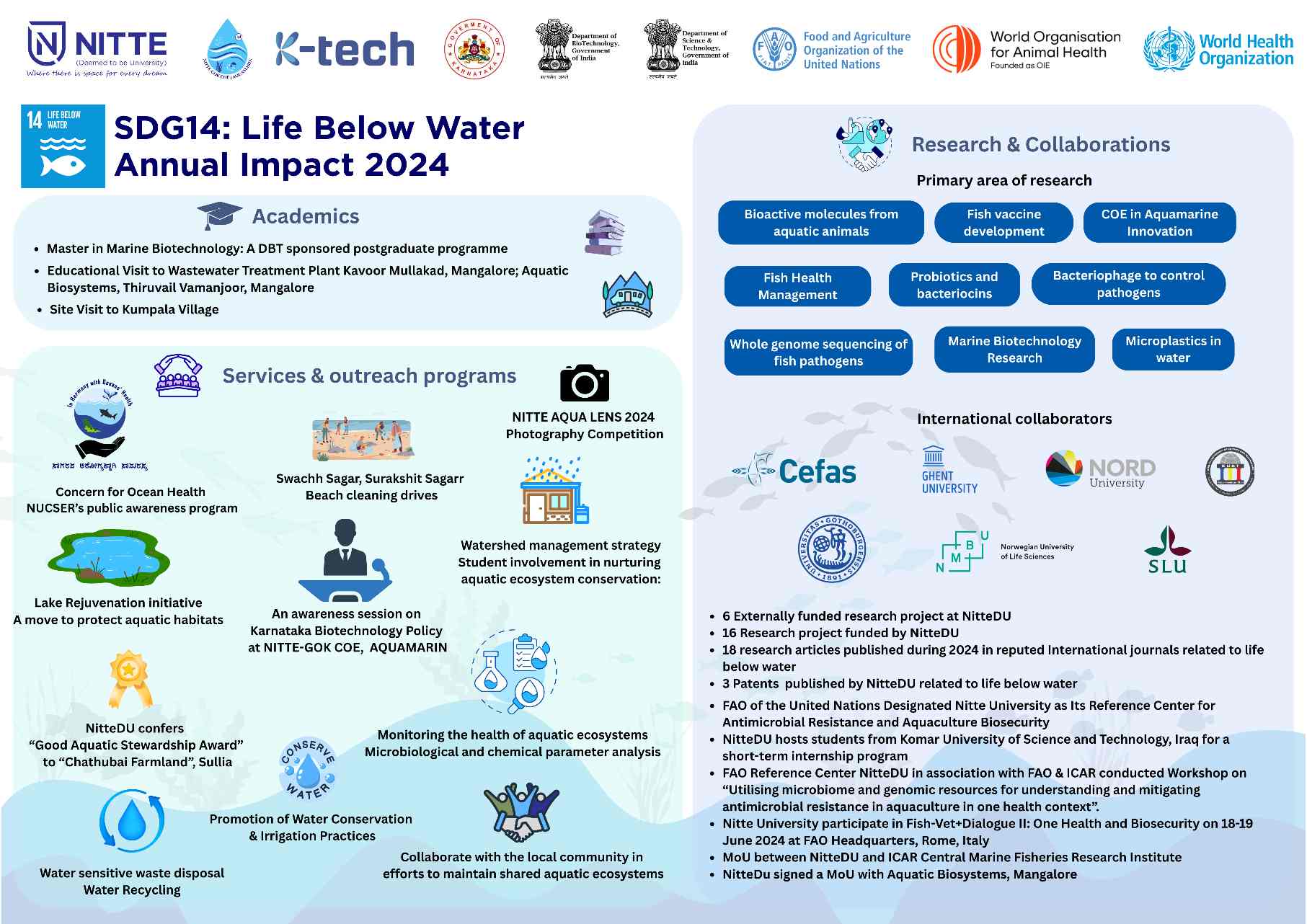
PROACTIVE STEPS TAKEN BY NU
International collaboration
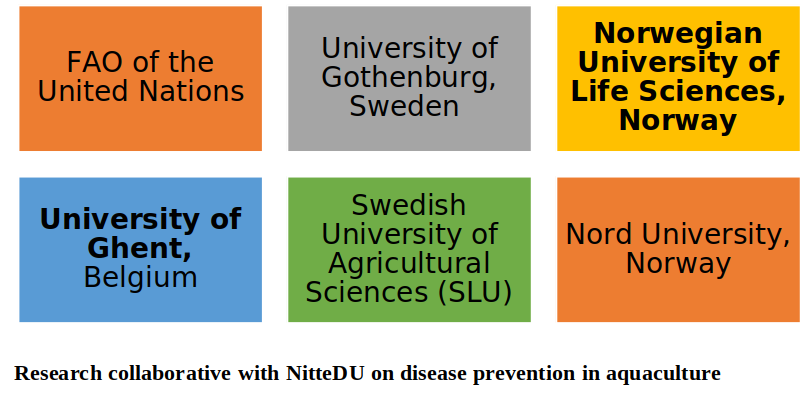
Collaborative research with Norwegian scientist to control fish disease in aquaculture
NitteDU is actively collaborating with scientist of Norway from Norwegian University of Life Sciences, Norway and Nord University through an collaborative research project entitled “Biotechnological approaches to prevent and control fish disease in aquaculture (BIOAQUA)” financially supported by the Department of Science & Technology (DST), Government of India. The joint project aims to promote scientific renewal and development of disciplines and/or to generate new knowledge about issues relevant to both societies in mutually agreed fields and to achieve bilateral world-class scientific results in the field of bioeconomy.
Meeting of NitteDU research investigators with CEFAS representatives
NUCSER investigators met with CEFAS representatives at the Taj Palace, New Delhi, on October 17, 2024, to review progress on the “CEFAS24-29” project and discuss future collaborations under the Ocean Country Partnership Programme. The teams shared updates, celebrated key advancements, and explored exciting opportunities for expanding research ties.
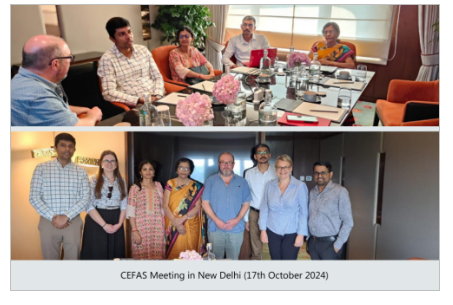
NitteDU hosts students from Komar University of Science and Technology, Iraq for a short-term internship program
Fifteen students from Komar University of Science and Technology, Iraq participated in a short-term internship program at NUCSER from 12th to 19th June 2024. The event was inaugurated in the august presence of Prof. Dr. M S Moodithaya, Vice Chancellor NitteDU, and Dr. Kawis Aziz Faraj, Vice President of Komar University of Science and Technology. During the program, the students received intensive training in various areas of biomedical science, including molecular techniques, handling non-mammalian animal models like zebrafish and Drosophila, and their applications in infectious disease biology, environmental toxicology, cancer biology, cell culture techniques, tissue engineering, as well as bio and nanotechnology.

Nitte designated FAO reference center for antimicrobial resistance and aquaculture biosecurity
The United Nations Food and Agriculture Organisation (FAO) has designated Nitte University, Mangalore as FAO Reference Center for Antimicrobial Resistance and Aquaculture Biosecurity. Nitte has the distinction of being one among the four centers designated by FAO, the others being Mississippi State University, United States; Pearl River Fisheries Research Institute, Guangzhou, China and Yellow Sea Fisheries Research Institute, Qingdao, China. The Government of India has endorsed this designation.
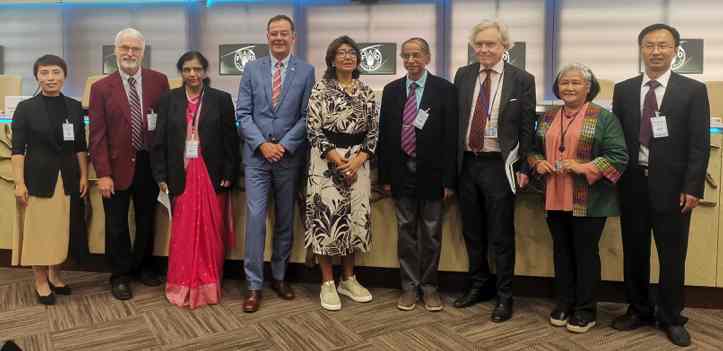
Event to designate Nitte University as FAO reference center for antimicrobial resistance and aquaculture biosecurity
FAO Reference Center Workshop at NitteDU
In line with the terms of reference of FAO Reference Center, NitteDU is celebrating antibiotic awareness week by organizing an international hands on Workshop on “Utilising microbiome and genomic resources for understanding and mitigating antimicrobial resistance in aquaculture in one health context”. This is being organized in collaboration with the Indian Council of Agricultural Research, New Delhi.

FAO Reference centre Workshop on Utilising microbiome and genomic resources for understanding and mitigating antimicrobial resistance in aquaculture in one health context
Nitte University participate at One Health and Biosecurity on 18-19 June 2024 at FAO Headquarters, Rome, Italy
The Indian delegation led by Dr. J.K. Jena (DDG Fy, ICAR) with Dr. Nilesh Pawar, Poonam Rani from the Department of Fisheries, GoI and Dr. Iddya Karunasagar, and Dr. Indrani Karunasagar (NitteDU) took part in Fish-Vet+Dialogue II: One Health and Biosecurity on 18-19 June 2024 at FAO Headquarters, Rome, Italy

Participation of NU at One Health and Biosecurity at FAO Headquarters, Rome, Italy
Research activities at NitteDU
Primary area of research:
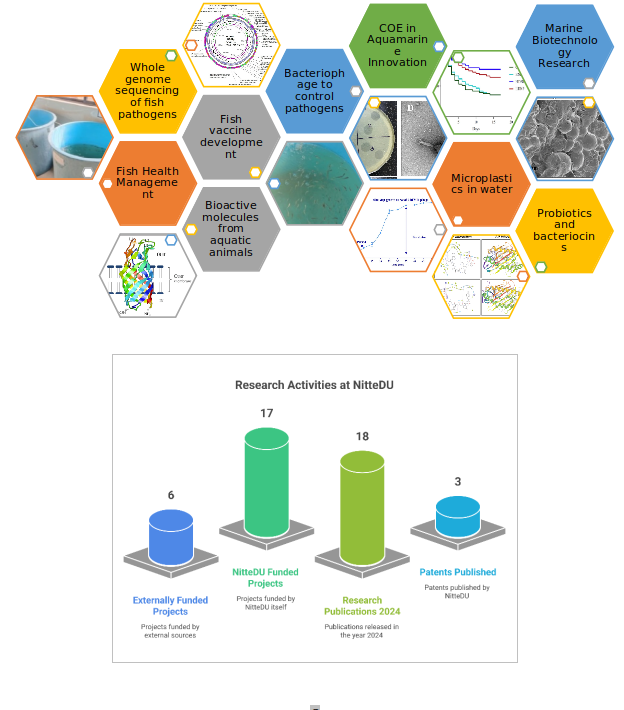
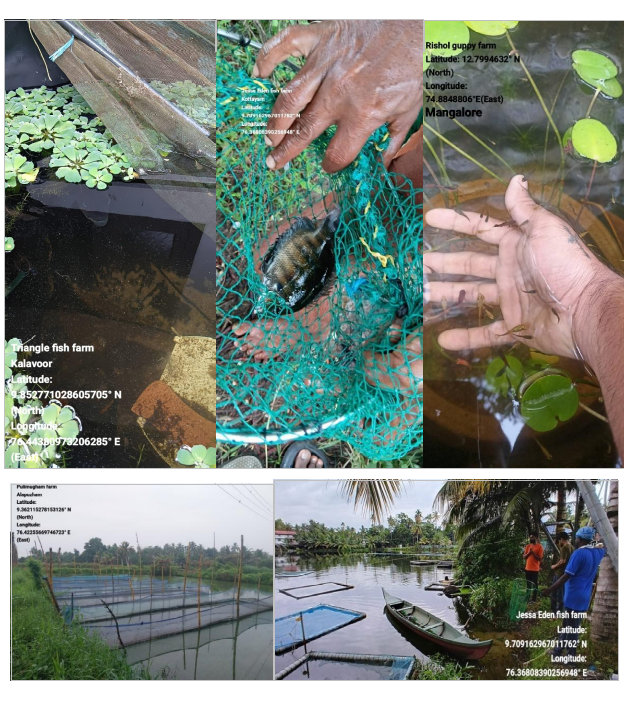
Fish farms for sample collection
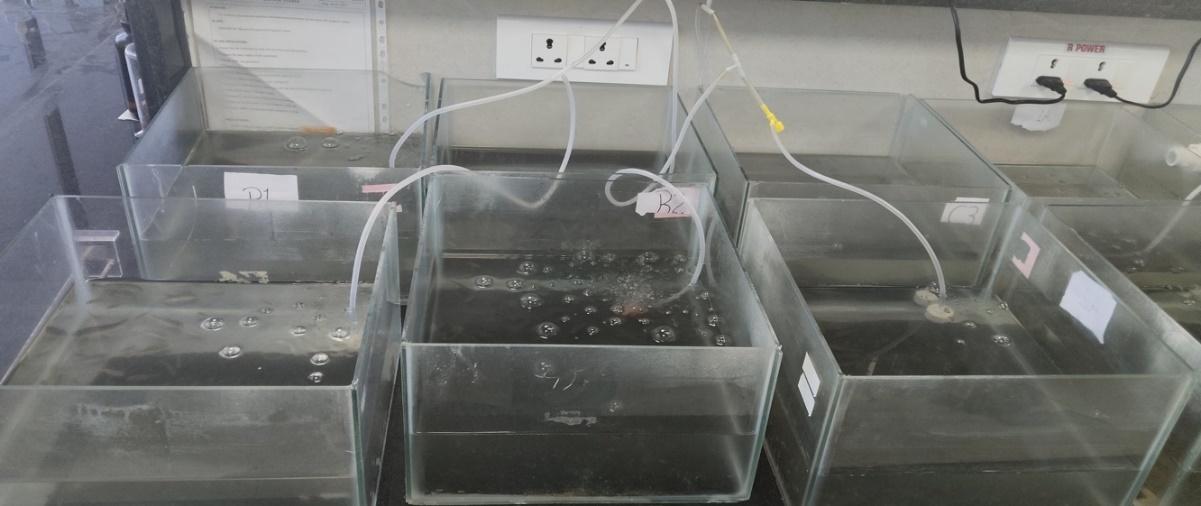
Stocking of zebrafish for vaccination study
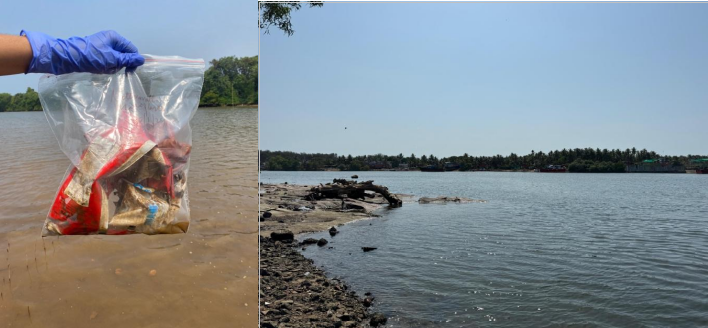
Plastic sample collection for analysis and research
Research Contributions Aligned with SDG 14: Life Below Water
Sustainable Aquaculture and Fish Health Management
Nitte University has focused extensively on enhancing aquaculture sustainability through innovative fish health strategies. Zebrafish are bred to generate embryos for experiments and maintenance of the breeding stock. To Validate the mutant strain of fish maintained in the facility, also in studies involving mutations transgenes or gene editing (CRISPR). The increasing prevalence of Streptococcus infection industry highlights the need for prioritising disease prevention over outbreak response. Streptococcus strains were identified in farm bred tilapia for the first time. Probiotics, particularly Bacillus subtilis, have been identified as promising agents for enhancing fish health and environmental sustainability. Supplementation of Bacillus subtilis in Rohu enhanced their growth performance, nutritional utilization, immune responses and resistance against pathogens. Additionally, bacteriocins were extracted from probiotic bacteria and research has been conducted on identifying antimicrobial peptides (AMPs) from shrimps, can be used as eco-friendly alternatives to antibiotics. as an alternative for antibiotics and further used for biocontrol bacterial diseases and sustainable aquaculture. Under UN SDG14, this research fixates on sustainability of aquaculture and poses to bring a beneficial change in the fish health and community.


Pollution, Resistance, and Marine Ecosystem Health
The University has conducted several studies on antibiotic resistance and pollution in the marine environment. Macroalgae surface provides a nutrient-rich environment for epiphytic microbial communities. Antibiotic-resistant bacteria associated with seaweed is an emerging issue emphasizing the complex interactions between the marine environment and human health. Multi-drug-resistant Bacillus species were identified from seaweeds in coastal environment in Karnataka, India, revealing their role in harbouring resistant bacteria. The distribution of antibiotic resistance genes in seawater samples of coastal Karnataka was studied and prevalent resistant genes were identified. Furthermore, estuarine plastic debris was found to carry antibiotic-resistant and pathogenic bacteria, along with metagenomic profiling to understand the role of marine microplastics in the spread of resistance and its impact on marine ecosystems
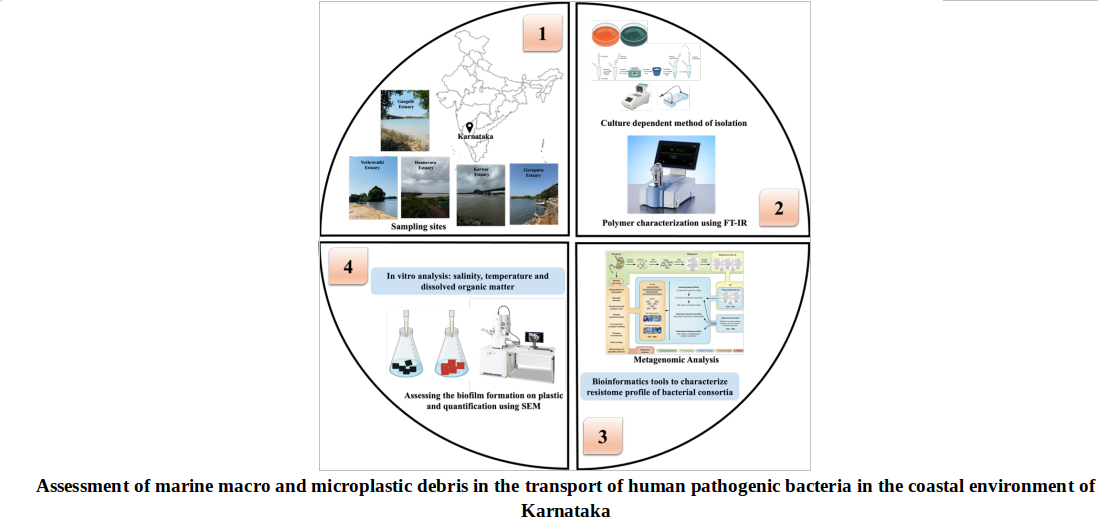
Marine Bioresources and Linkage to Human Health
Nitte University has explored the biochemical profile of macroalgae and the therapeutical potential of fish protein hydrolysates. The biochemical diversity and promising bioactivities of macroalgal extracts of Ulva fasciata, Ulva rigida, and Gracilaria arcuata indicated their potential for various pharmaceutical applications. Fourier-transform infrared (FTIR) analysis confirmed diverse functional groups linked to health benefits.. Fish protein hydrolysates showed neuroprotective activity in a Drosophila Parkinson’s disease model, suggesting possible nutraceutical applications. This can help develop a treatment for Parkinson’s disease. Additionally, a PCR based assay combining CRISPR-Cas12a was developed for early detection of Enterocytozoon hepatopenaei, that causes Hepatopancreatic microsporidiosis (HPM), leading to slow growth in penaeid shrimp without causing death
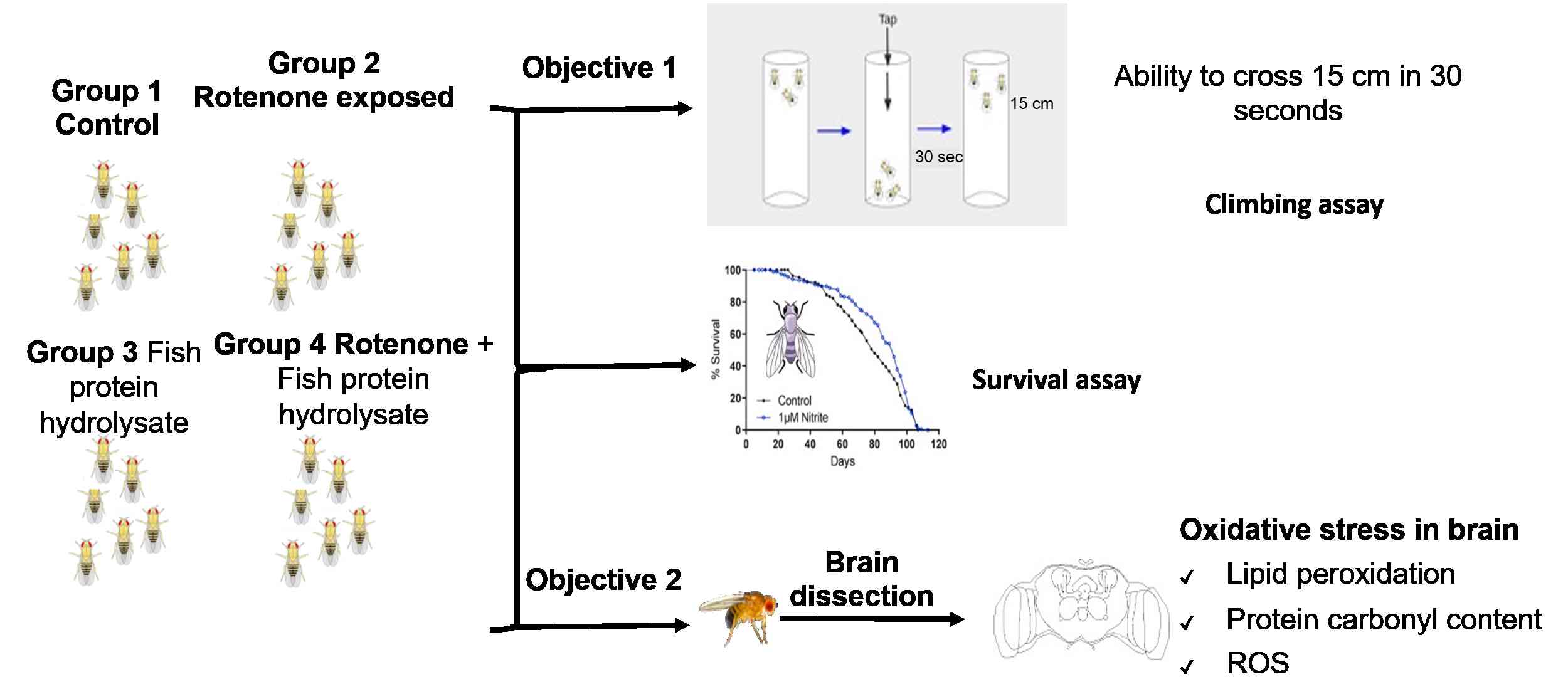
Neuroprotective efficacy of Fish Protein Hydrolysate using Drosophila melanogaster model
Design and Fabrication of an Eco-Friendly Remote controlled Fish Catching Bot for Coastal Fishing
It offers a technological solution to mitigate overfishing and promote community-focused, sustainable fishing practices. The eco-friendly, remote-controlled fish-catching bot is designed to selectively capture target species without causing physical harm, significantly reducing bycatch and preserving juvenile and non-target fish populations. Its low-noise, low-vibration design minimizes ecological disturbance, making it suitable for both research and commercial applications. Additionally, the bot enhances fisher safety by reducing human exposure to harsh marine conditions, providing a sustainable alternative to conventional, non-selective fishing methods.
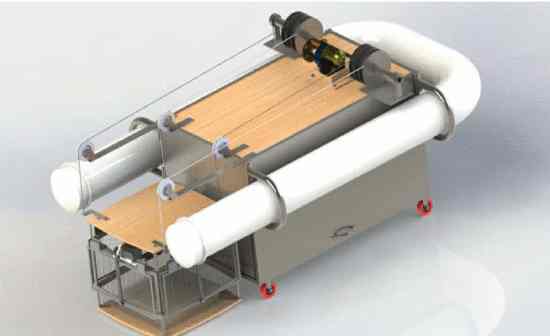
3D Model of the Fish Catching Bot
Unmanned vessel for water pollution monitoring
Water quality monitoring is essential for environmental preservation and safe water use. Current systems allow real-time, automated assessments of parameters such as temperature, turbidity, pH, and total dissolved solids (TDS). IoT-based system for continuous, remote water quality monitoring. Sensors wirelessly send data to the Arduino Cloud, accessible via desktop or mobile devices. The system uses an ultrasonic A220YUW sensor to detect floating waste and visual pollution. An autonomous unmanned vehicle, controlled by an Arduino Nano RP2040, maps water quality variations across rivers, lakes, and ponds, initiating corrective actions when safety thresholds are exceeded.

Fish species classification using deep learning
The research focused on automating fish species classification using deep learning. Accurate classification aids marine biologists in conservation and ecosystem studies. Tracking fish populations, especially endangered species, is crucial for biodiversity management. Unlike existing methods suited for non-watery environments, this study addressed underwater challenges like noise and image distortion. It proposed a MobileNet-based approach, leveraging transfer learning, data augmentation, and early stopping to enhance model performance. MobileNet’s lightweight architecture enabled fast, accurate classification, making it suitable for real-time applications. The developed classification system achieved an overall accuracy of 85%, offering a scalable and efficient solution compared to conventional techniques.
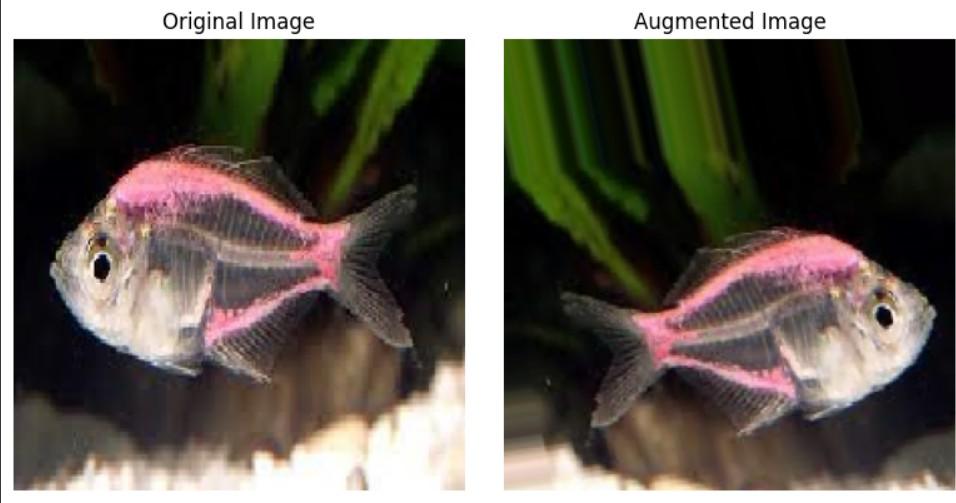
Original and augmented images showing the transformations applied to the dataset.
Formal MoUs between academic institute and industry
MoU between NitteDU and ICAR Central Marine Fisheries Research Institute
Signing of MoU between NitteDU and ICAR- Central Marine Fisheries Research Institute on July 5, 2024. Dr A Gopalakrishnan, Director- ICAR-CMFRI; Dr Grinson George, Head- Marine Biodiversity and Environment Management; Dr. Sujitha Thomas, Principal Scientist and Dr M S Moodithaya, the Hon’ble Vice Chancellor NitteDU; Dr Indrani Karunasagar, Director- Projects and DST TEC; Dr Praveen Shetty, Director- Research and Development, NitteDU and DST TEC staff were present on occasion.
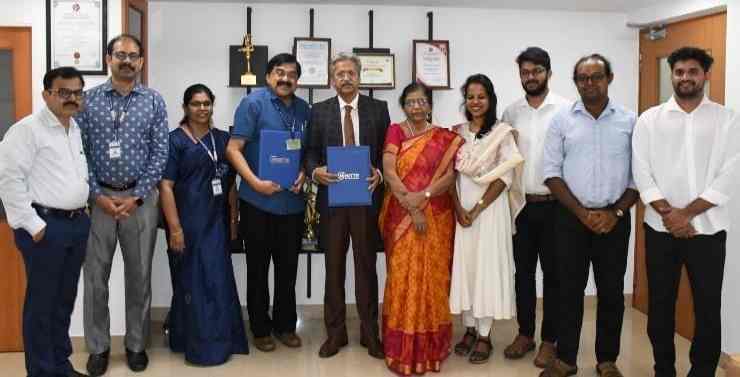
MoU between NitteDU and ICAR Central Marine Fisheries Research Institute
NitteDU signed a MoU with Aquatic Biosystems, Mangalore
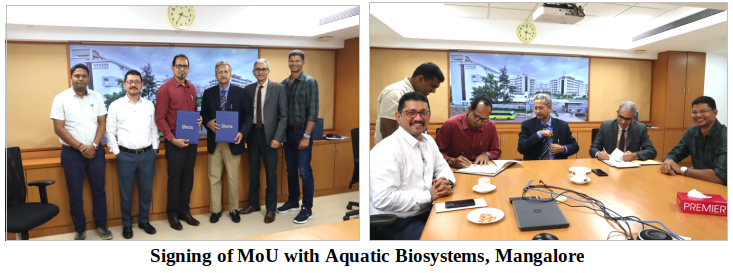
Academic activities at NitteDU
Master in Marine Biotechnology: A DBT sponsored postgraduate programme
NitteDU continues to offer Department of Biotechnology, Government of India sponsored postgraduate programme on Marine Biotechnology at NitteDU Centre for Science Education & Research (NUCSER), Paneer campus, Mangalore. The program's focus is to provide appropriate theoretical knowledge and laboratory skills for developing various biotechnological tools and technologies in marine sciences and to implement the needs of the economy through marine entrepreneurship, study of marine environmental systems and fisheries, and development of marine biotechnological processes. The program provides training in basic and advanced skills meant to empower youth to develop the sustainable strategy of harnessing the marine environment for food, medicines and other resources.
Education visit to Aquatic Biosystems, Thiruvail Vamanjoor, Mangalore
As part of their academic curriculum, the second year M.Sc. Microbiology and second year M.Sc. Biotechnology students of NUCSER visited Aquatic Biosystems, located at Thiruvail, Vamanjoor, Mangalore, on 28th November 2024. The visit aimed to gain insights into ornamental aquarium fish's operations, management, and breeding practices Outreach programmes Beach Cleaning Drives at Tannirbavi Mangalore and Yarmal Beach, Udupi The NSS wings of NUCSER and As part of the Swachhta Hi Seva initiative and the NSS wing of NUCSER participated in the mega event “Swachh Sagar, Surakshit Sagar”-2024 on Gandhi Jayanthi, October 2, 2024, held at Tannirbavi Beach, was a joint effort by NitteDU, Yenepoya University, and Mangaluru University as part of the Swachh Sagar Abhiyan for coastal clean-up in Mangaluru. Similarly, The NSS unit of NMAM Institute of Technology, Nitte, celebrated Gandhi Jayanti and Lal Bahadur Shastri Jayanti on 2nd October 2024 by organizing a beach cleaning drive at Yarmal Beach, Udupi. Aligned with the Swachh Bharat Abhiyan, around 60 student volunteers participated, collecting 40 bags of waste Swachh Sagar Abhiyan Nitte Institute of Physiotherapy organized the Swachh Sagar Abhiyan in collaboration with the Ramakrishna Mission, Mangaluru, at Tannirbhavi Beach on 8th September 2024 on the occasion of World Physiotherapy Day. The function was presided over by Swamy Jitakamanandaji Maharaj. The vote of thanks was delivered by Prof. Rakesh Krishna, the event's convenor. Approximately 500 students and volunteers participated in cleaning the beach. Swachh Sagar, Surakshit Sagar – Clean Coast, Safe Sea – 2024 As part of the Swachh Sagar, Surakshit Sagar – Clean Coast, Safe Sea – 2024 initiative organized by the Ministry of Youth Affairs and Sports, Government of India, under the Swachhta Hi Seva campaign, a beach cleaning drive was conducted at Tannirbhavi Beach, Mangalore. The event was organized under the instructions of the Regional Director, NSS Bangalore, and hosted by Nitte Deemed to be University, Yenepoya University, and Mangalore University. The NSS unit of Nitte Institute of Speech and Hearing actively participated in this event. A total of 16 students had involved in the activity. Awareness programmes Concern for Ocean Health: NUCSER’s public awareness program NUCSER staff and students along with Regional Centre of ICAR-Central Marine Fisheries Research Institute and College of Fisheries, Mangalore conducted a unique roadshow/awareness event on Ocean Health- Our Actions and Our Future on 26th January, 2024 at the Fiza by nexus Mall, Pandeshwar, Mangalore . The activities of the event aimed at addressing important issues pertaining to preservation and conservation of marine health through fun-filled programs that included skits performed by students of NUCSER and College of Fisheries, Mangalore on Mangrove conservation, Save our Sharks, and Menace of Plastic Pollution of Sea. The event also witnessed flash mobs by the students and quiz on marine topics for the general public. NitteDU confers “Good Aquatic Stewardship Award” to “Chathubai Farmland”, Sullia NUCSER organized a felicitation program on “Good Aquatic Stewardship Practices” on November 25, 2024, at Chathubai Farmland, Sullia Taluk, Dakshina Kannada. During the event, Mr. C.K. Naveenchandra was honored for his remarkable contributions to freshwater pearl farming and integrated agricultural practices. As part of the program, he demonstrated the techniques of pearl inoculation, culture, and harvesting, inspiring participants with practical insights. The event was attended by postgraduate students and teaching and non-teaching staff from NUCSER.. An awareness session on Karnataka Biotechnology Policy at NITTE-GOK COE, AQUAMARIN The NITTE-GOK Centre of Excellence in Aquamarine Innovation (NITTE-GOK COE |AQUAMARIN), NitteDU, organized an awareness session on the Karnataka Biotechnology Policy at the Seminar Hall of NUCSER on 2nd Dec, 2024. Smt. Parnika Pavanram, General Manager (Biotechnology), KITS, Dept. of Electronics, IT, BT and S & T, Govt of Karnataka, was the resource person for this program. Over 90 delegates representing startups, biotech, pharma, and food industries, higher education institutions, business incubators, other Govt. organizations, fish processing plants, and PG students participated in this event. Promotion of Water Conservation & Irrigation Practices NUCSER, NitteDU, in collaboration with the Department of Horticulture, Mangaluru, organised a program on "Water Conservation and Irrigation Practices" at Akshaya Farm, Talapady, on 23rd November 2024. The event was attended by farmers from the region, postgraduate students, and faculty members from NUCSER. NITTE AQUA LENS 2024 Photography Competition NitteDU conducted AQUA LENS 2024 photography competition to capture the essence of water conservation on campus related to shots that reflect water-saving practices, awareness, or its impact. Winners were honored at the Republic Day celebrations on 26th January, 2025 at NitteDU. Link to video: https://www.youtube.com/watch?v=zXZ8WzIhFf4 Student involvement in nurturing aquatic ecosystem conservation: In NitteDU, modules are inculcated to educate the faculty and students. Classroom activities will be explored to explore how to use the ocean sustainably. Backed up with a strong research team more projects will be undertaken. As we are housed in coastal area, conservation of marine areas can be easily employed. We at NitteDU believe and abide by “Live and let live” Be it human being or a tiny fish, every being is provided utmost care. Oceans cover almost 70% of earth’s surface area and are responsible for 70% of earth’s oxygen production. The marine environment represents a complex, diverse, and a dynamic ecosystem which serves as a source of food and other resources. However, due to the land-based anthropogenic activities including urbanization, capture fisheries, industrial developments, tourism, there is a constant pressure on the marine ecosystem to protect its diversity in terms of form, structure, physiology and chemistry. Among the many threats currently challenging the dynamism that a marine ecosystem truly reflects; plastics represent the single largest threat in today’s context. Thus, it is necessary to create awareness on preventing and reducing marine pollution to protect the ecosystem for future generations. Schools and colleges play a major role because young people spend a lot time with peers in educational institutions. NitteDU is committed to educating the stakeholders of the society on issues of marine pollution and about the measures that can be implemented to prevent and reduce the pollution of marine ecosystem. Monitoring the health of aquatic ecosystems Groundwater analysis In India, ground water is highly polluted with chemicals that runoff from industrial and agricultural wastes, and microbial contamination arises due to sewage contamination. Routine groundwater monitoring would provide surveillance and timely intervention to mitigate further damages. Increased anthropogenic activities have caused a drastic increase in both chemicals and microbial pollution in fresh waters. Groundwater samples from various locations in Mangalore were collected and tested for chemical parameters beyond permissible limits and microbiological quality. Analysis of Chemical Parameters Heavy metals interfere with the normal physiology of the human body. It binds to cellular components, leading to dysfunction of the metabolic processes in our body. This study was undertaken to study the geospatial distribution of selected heavy metals in open-well waters within Mangalore City Corporation limits. Water samples were collected from all 60 wards in the jurisdiction of Mangalore City Corporation. The fluoride concentration was estimated using the spectrophotometric method using the Sodium 2-(parasulfophenylazo)-1,8-dihydroxy3,6-naphthalene disulfonate (SPADNS) reagent. Similarly, iron was estimated using the phenanthroline reagent. The findings report that the pH of the samples was acidic in 20 wards. Panambur, Kunjathbail North, Mannagudda, Court, and Cantonment water was colored. Kunjathbail (North), Kunjathbail (South), Kambala, Kadri North, Bendoor, Bolar, Mannagudda, and Markada, showed high turbidity levels. The fluoride concentration in the samples collected from 60 wards of Mangalore city was less than 1.5 ppm, which is the permissible limit by the World Health Organization. Iron is within the permissible limit except for the wards Court and Boloor, which showed an iron concentration of 0.4 ppm and 3.08 ppm, respectively. However, arsenic was not detected in any of the 180 samples collected from the 60 wards of Mangalore City Corporation. Microbiological analysis: Water samples from various locations in Mangalore city were sampled and tested for potability, fecal coliforms, and total coliforms. In cases where the water was found to be contaminated, corrective measures were suggested. Follow-up analyses were also conducted to monitor the quality. The biodiversity of the water body in the upcoming Nitte campus was also studied. Collaborate with the local community in efforts to maintain shared aquatic ecosystems
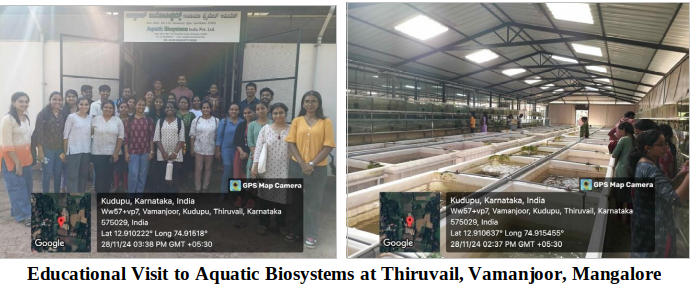
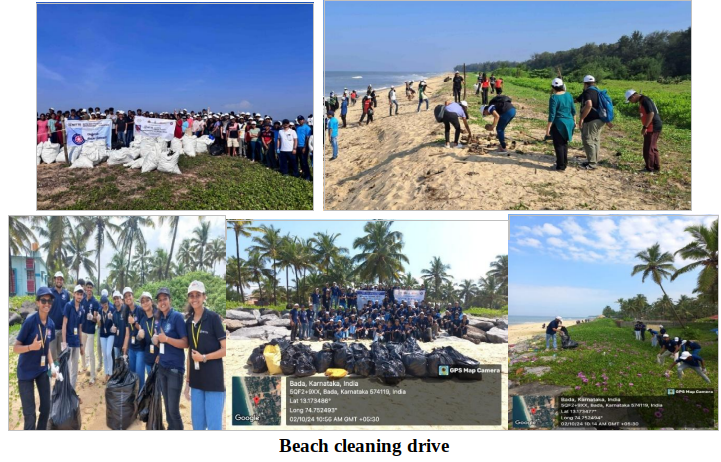
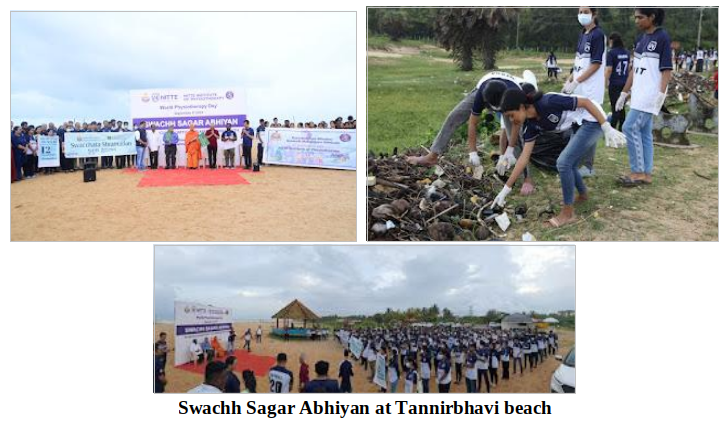
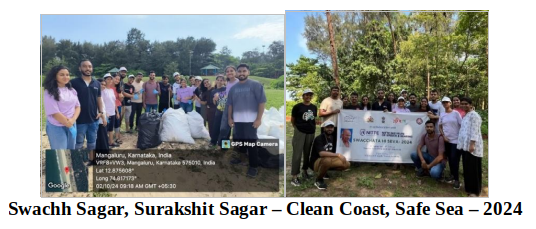
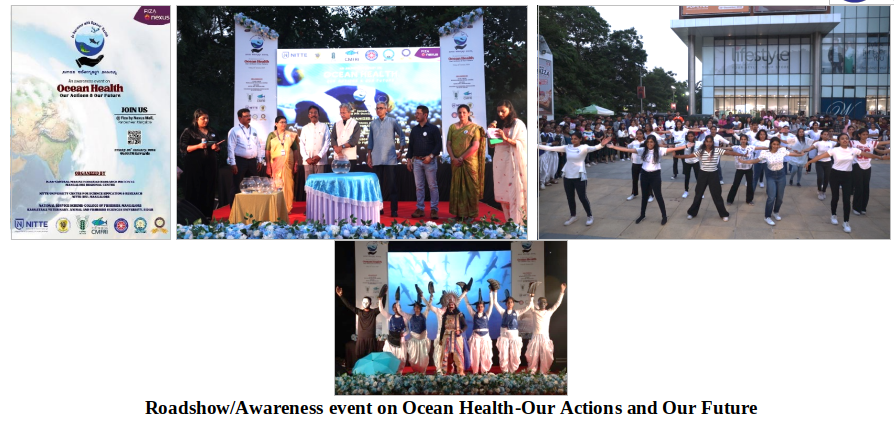
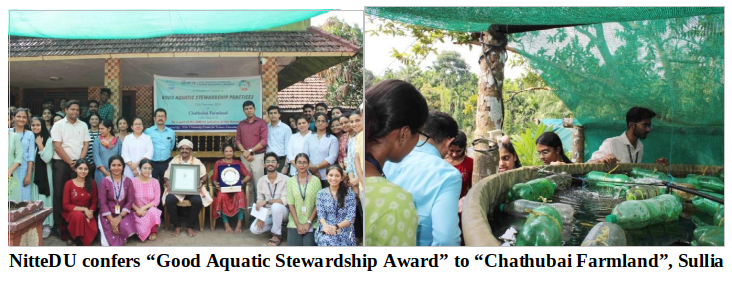
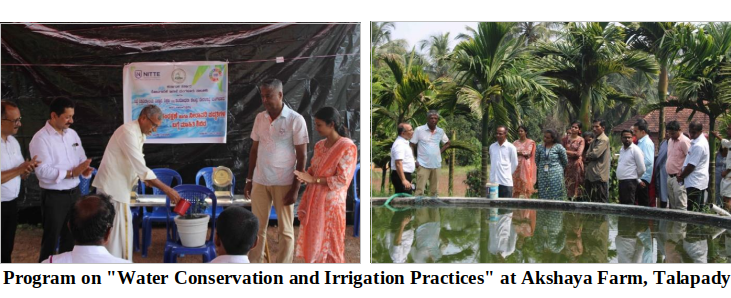

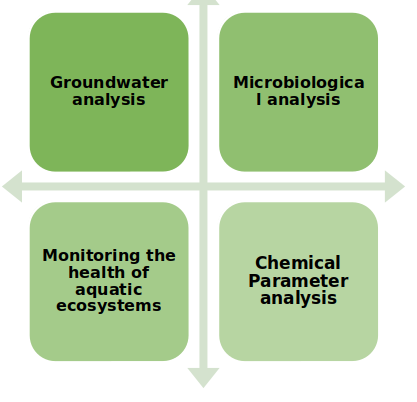


.png)